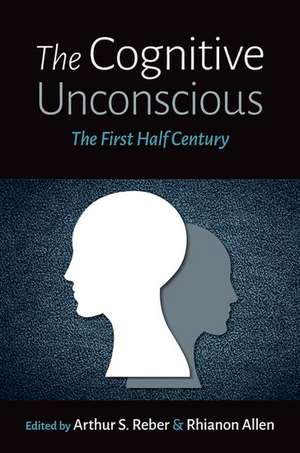The Cognitive Unconscious: The First Half Century
Arthur S. Reber, Rhianon Allenen Limba Engleză Hardback – 29 sep 2022
Preț: 392.82 lei
Preț vechi: 487.44 lei
-19% Nou
Puncte Express: 589
Preț estimativ în valută:
75.17€ • 78.33$ • 62.24£
75.17€ • 78.33$ • 62.24£
Carte disponibilă
Livrare economică 03-08 martie
Preluare comenzi: 021 569.72.76
Specificații
ISBN-13: 9780197501573
ISBN-10: 0197501575
Pagini: 400
Dimensiuni: 237 x 160 x 29 mm
Greutate: 0.7 kg
Editura: Oxford University Press
Colecția OUP USA
Locul publicării:New York, United States
ISBN-10: 0197501575
Pagini: 400
Dimensiuni: 237 x 160 x 29 mm
Greutate: 0.7 kg
Editura: Oxford University Press
Colecția OUP USA
Locul publicării:New York, United States
Recenzii
This substantial collection of chapters examining what has been called by many names-the unconscious, the non-conscious, implicit memory, or tacit memory-will serve a number of different audiences...the text reads well, and is representative of modern views on the issues from researchers who have spent long and fruitful time in the field.
Research on implicit learning and memory has played a pivotal role in modern psychology and neuroscience. The Cognitive Unconscious provides a comprehensive and engaging overview of the impressive progress that has been made during the past half-century. With contributions from leading experts, this authoritative volume is must reading for anyone interested in the implicit influences that shape the human mind and behavior.
One of the great discoveries about the structure of cognition is the extent to which implicit (unconscious) processes determine what we see and how we learn. This engaging and wide-ranging collection of ably edited chapters describes the origin of this idea and shows how unconscious cognitive processes have proven to be ubiquitous and fundamental to mental life.
This book is a tour de force, a definitive guide for still mysterious topic of the cognitive unconscious. Reber and Allen organized an excellent collection of authors and writings at the forefront of this vibrant but oft-neglected topic, reaching out into areas including general neuro-physiology and biology. Chapters are written in informative style, accessible also to general readers. An absolute must for anybody interested in implicit learning and the cognitive unconscious.
Implicit learning is an exacting field in which experimental designs must be explicitly clever. The Cognitive Unconscious is a remarkable collaboration of renowned experts and a tour de force contribution to this field. Its insights transcend psychology, encompassing all disciplines that investigate cognitive awareness, the subconscious mind, and their adaptive role in evolution, extending from the primordial conscious cell forward. I highly recommend this absorbing, benchmark book.
This volume provides comprehensive coverage of a remarkable array of topics related to the cognitive unconscious. It is rare, in our increasingly fragmented academic environment, to integrate such a diverse range of approaches through a cohesive organizing theme. The personal notes throughout the volume offer an engaging first-hand perspective on the development and flowering of research on implicit learning and the cognitive unconscious.
This book is bursting with insights into what lies below the surface of our conscious minds. We may not be privy to the cognitive unconscious directly, but this fascinating underworld (what Kahneman called System 1) actually dictates much of what we do and who we are.
Research on implicit learning and memory has played a pivotal role in modern psychology and neuroscience. The Cognitive Unconscious provides a comprehensive and engaging overview of the impressive progress that has been made during the past half-century. With contributions from leading experts, this authoritative volume is must reading for anyone interested in the implicit influences that shape the human mind and behavior.
One of the great discoveries about the structure of cognition is the extent to which implicit (unconscious) processes determine what we see and how we learn. This engaging and wide-ranging collection of ably edited chapters describes the origin of this idea and shows how unconscious cognitive processes have proven to be ubiquitous and fundamental to mental life.
This book is a tour de force, a definitive guide for still mysterious topic of the cognitive unconscious. Reber and Allen organized an excellent collection of authors and writings at the forefront of this vibrant but oft-neglected topic, reaching out into areas including general neuro-physiology and biology. Chapters are written in informative style, accessible also to general readers. An absolute must for anybody interested in implicit learning and the cognitive unconscious.
Implicit learning is an exacting field in which experimental designs must be explicitly clever. The Cognitive Unconscious is a remarkable collaboration of renowned experts and a tour de force contribution to this field. Its insights transcend psychology, encompassing all disciplines that investigate cognitive awareness, the subconscious mind, and their adaptive role in evolution, extending from the primordial conscious cell forward. I highly recommend this absorbing, benchmark book.
This volume provides comprehensive coverage of a remarkable array of topics related to the cognitive unconscious. It is rare, in our increasingly fragmented academic environment, to integrate such a diverse range of approaches through a cohesive organizing theme. The personal notes throughout the volume offer an engaging first-hand perspective on the development and flowering of research on implicit learning and the cognitive unconscious.
This book is bursting with insights into what lies below the surface of our conscious minds. We may not be privy to the cognitive unconscious directly, but this fascinating underworld (what Kahneman called System 1) actually dictates much of what we do and who we are.
Notă biografică
Arthur S. Reber is an Adjunct Professor in the Department of Psychology at the University of British Columbia. He completed his Ph.D. at Brown University under the direction of Richard Millward. His primary focus has been on implicit or unconscious learning based on principles of evolutionary biology. Rhianon Allen is Professor Emerita at Long Island University and an Affiliate Professor at the University of British Columbia.
